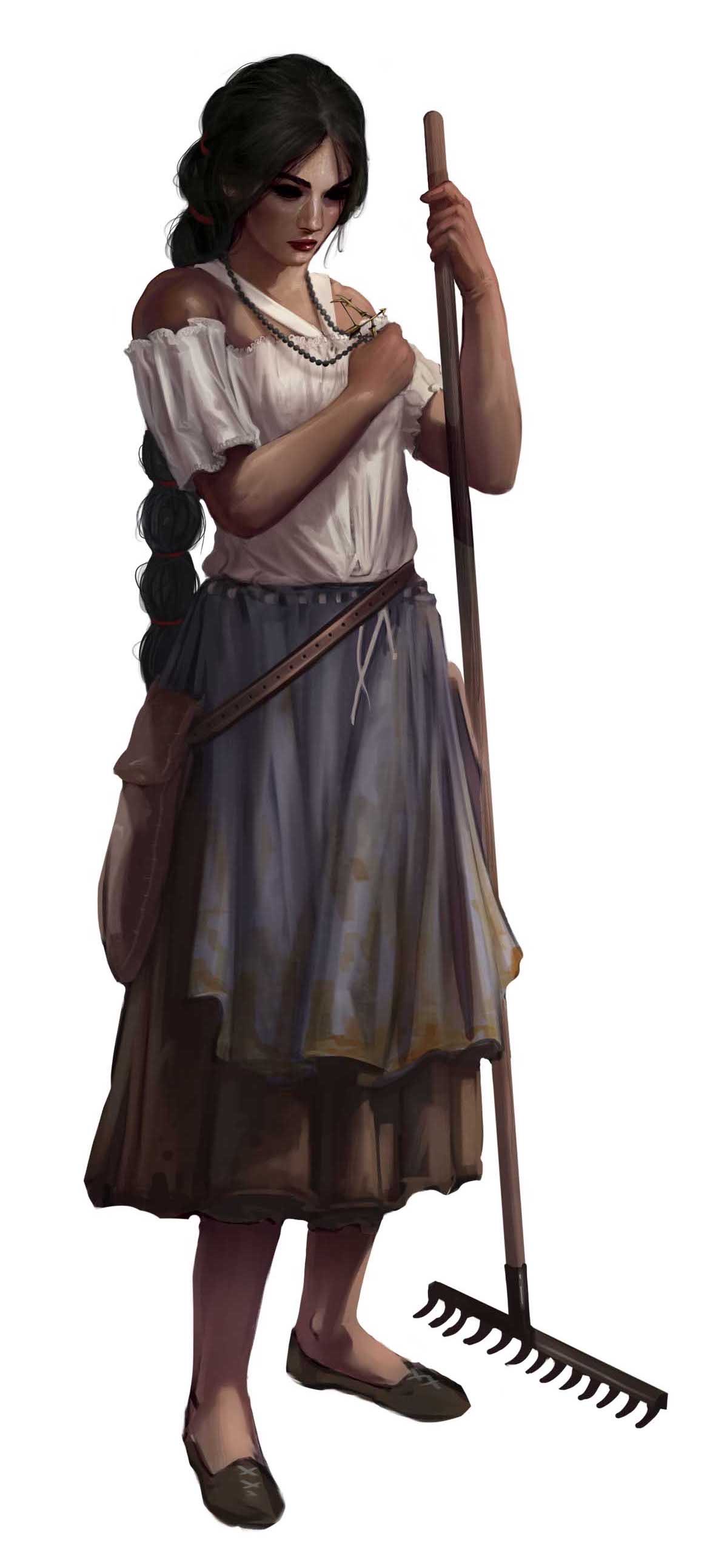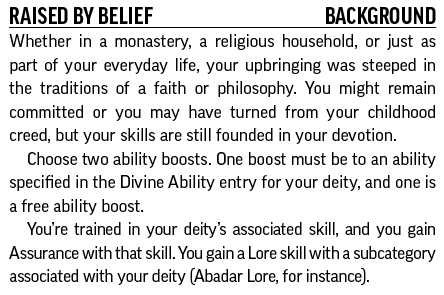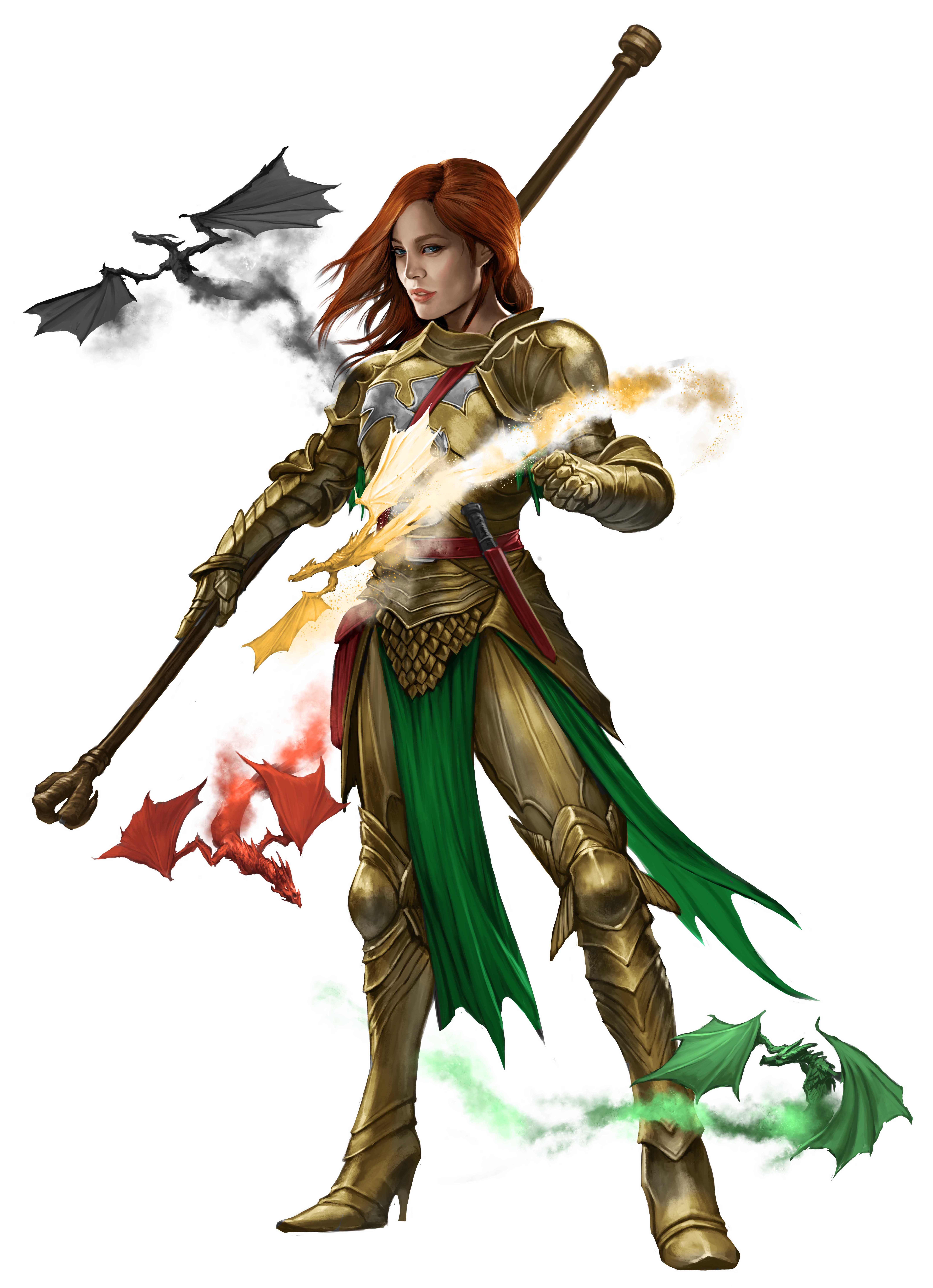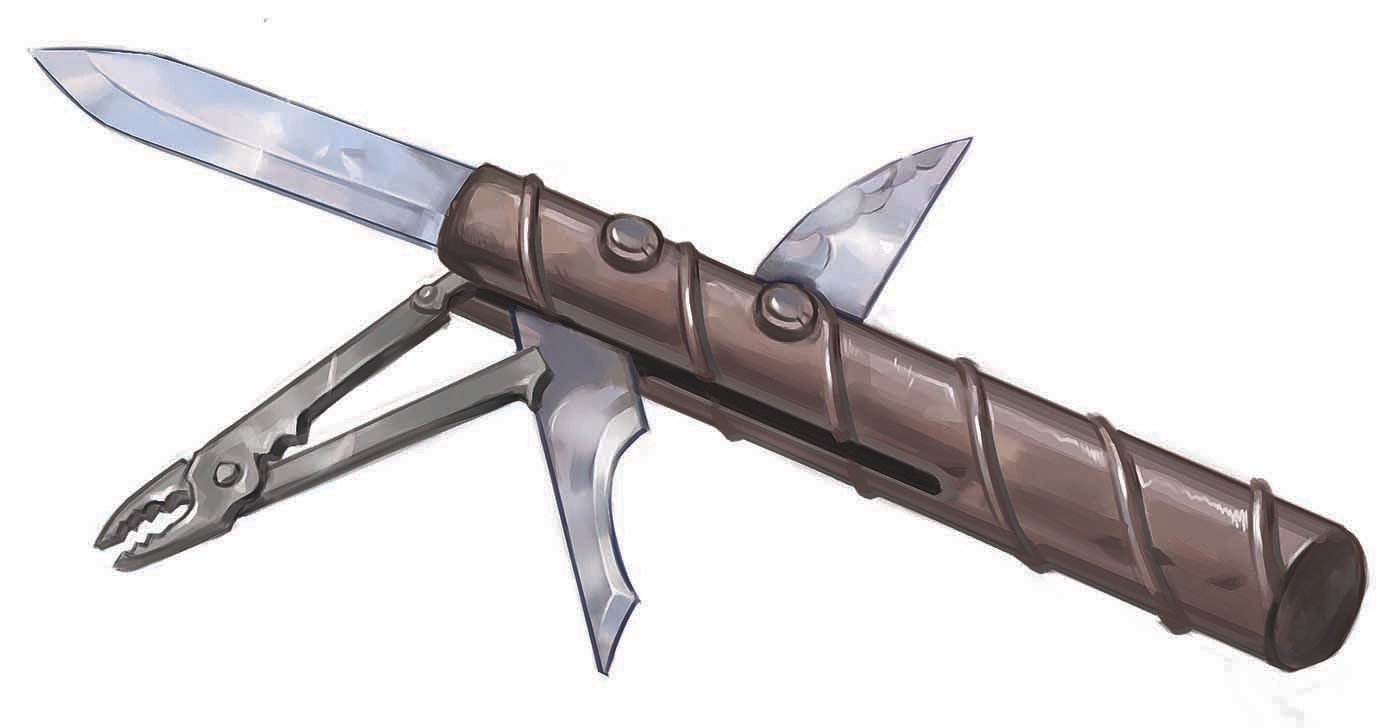Characters living in the Age of Lost Omens have the unique benefit of being able to speak directly with their gods and have these gods directly influence the world around them. This is especially true of player characters, who typically have a direct line to their given gods, particularly in the case of faithful classes like champions and clerics. You can think of Lost Omens Gods & Magic as a catalog to help you decide not only what faith your character can follow, but also what benefits you gain for said worship.
The most obvious benefit is new options for your character. Gods & Magic has new domains, equipment, feats, and spells for all faithful types, but we wanted to make sure that these options were not simply limited to characters who were champions and clerics. Faith is important to all manner of character in Golarion, whether you are a barbarian praying to Gorum for strength or an investigator praying to Zohls for guidance on the latest case. As a result, many of the options contained in the book are available to all classes and are meant to encourage players to play up the faithful sides of their characters. A great starting point for these options is with the new background featured in the book.
This background ties into your deity’s Divine Ability, a selection of two different ability scores that best represents your faith. Abadar, for example, has Constitution and Intelligence listed as his Divine Ability while Zon-Kuthon has Constitution or Wisdom. Every deity in the book features a Divine Ability, allowing this background to function with any deity necessary for your character concept.
In addition to the background, we also present several feats. Most of these feats are available to all characters, allowing any faithful to gain benefits from their devout worship. As a note, some of these feats are restricted to particular faiths, such as the Sanctify Water feat that only functions for followers of a good or evil deity as it allows you to create holy water or unholy water respectively. Other feats are tied to specific classes, like Sacred Ki which allows monks to convert the damage from their ki blast into an alignment that matches that of their deity. One particular favorite of mine is Battle Prayer, which allows you to blast a foe with the power of scripture!
Now, as this book is titled Gods & Magic, one would assume that there is plenty of magic. Oh, boy, is there! This book features 14 pages of new spells and focus spells. Again, as we didn’t want to lock these spells to only characters with domains, a large portion of these spells are part of the arcane, occult, or primal traditions, making them perfect additions to your bard’s repertoire or your wizard’s spell book. Some of these spells include old classics that have been updated for Second Edition like anticipate peril, ill omen, shifting sand, and of course, cup of dust!
Although these spells aren’t part of the divine tradition, it doesn’t mean that clerics are out of luck when it comes to these spells. Many of these new spells are on the list of cleric spells granted by a deity, allowing worshippers of the correct god to gain these new spells, too! Are you sad that you missed out on time beacon, the cool new spell that allows you to turn back the clock and undo negative effects on you? Worry not! Just follow Shyka the Many or… erm… Yog-Sothoth and you can have this cool spell, too!
Magic takes many forms. For clerics, a significant portion of their magic is in the form of domains. Gods & Magic features 18 new domains that run the gamut of different concepts and themes. The Dust domain, for example, calls upon the power of the gods to dry and crumble what opposes you, allowing you call swirling dust with the dust storm spell. The void domain, on the other hand, lets you rend reality and create a rift that pulls creatures toward it with door to beyond. These new domains also cover general concepts that we didn’t have a chance to include in the Core Rulebook like the cold domain.
Finally, let’s take a look at some of the cool equipment featured in this book. Most of the deities featured in Gods & Magic are ones that are being updated to Pathfinder Second Edition. Where we could, we tried to make sure these deities are exactly the same as they were originally, only swapping out things like the strength domain for the might domain where necessary. As a result, we needed to update a good number of favored weapons or even create brand new favored weapons for the new deities premiering in this book.
These weapons range from classics like bladed scarf, fighting fan, and khopesh to brand new weapons like the polytool, a metal rod with several tools folded inside. The polytool is the favored weapon of Casandalee and her faithful, allowing her followers to always have whatever tool they need for a given task, be it crafting or fighting enemies. In addition to these new weapons, we also provide a number of new magic items, each with ties to a particular faith. These include the bottomless stein, a stein for Cayden’s faithful that never runs empty, the dagger of eternal sleep, a dagger used by Achaekek’s followers that automatically critically hits a sleeping target, and Urgathoa’s dreadsmoke thurible.
As you can see, there are lots of goodies for those who are willing to follow the edicts of their faith, whether they are clerics or not. All of these options and more await anyone willing to take a leap of faith with Lost Omens Gods & Magic, releasing later this month on January 29th.
Luis Loza
Developer
Faith It 'Til You Make It!
Tuesday, January 14, 2020




![Battle Prayer [one-action] Feat 7
Divine, General, Skill
Prerequisites master in Religion, you follow a deity
Calling out to your deity, you recite scripture to harm a foe. When you select this feat, choose chaos, evil, good, or law. Your choice must match one of your deity’s alignment components.
Attempt a Religion check against the Will DC of a foe within 30 feet. The foe is then temporarily immune to Battle Prayers from your deity for 1 day.
Critical Success You deal 2d6 damage of the chosen alignment type, or 6d6 damage if you have legendary proficiency in Religion.
Success You deal 1d6 damage of the chosen alignment type, or 3d6 damage if you have legendary proficiency in Religion.
Failure There is no effect.
Critical Failure The backlash of your foe’s will against your prayer prevents you from using Battle Prayer again for 10 minutes.](https://cdn.paizo.com/image/content/Blog/011020_battleprayer_500.png)
![Cup of Dust Spell 3
Curse, Necromancy
Traditions arcane, occult, primal
Cast [three-action] material, somatic, verbal
Range 30 feet; Targets 1 living creature
Saving Throw Fortitude; Duration 1 day
You curse the target with a thirst no drink can quench. You can Dismiss the spell. The target must attempt a Fortitude save.
Critical Success The creature is unaffected and is temporarily immune for 1 hour.
Success The creature is fatigued for 1 round.
Failure The creature is immediately afflicted by thirst as if it hadn’t had a drink in days. It becomes fatigued and takes 1d4 damage each hour that can’t be healed until it quenches its thirst. No amount of drinking can quench the creature’s thirst during the spell’s duration.
Critical Failure As failure but the creature takes 2d4 damage each hour, twice as much as usual for thirst.
Heightened (+3) The thirst becomes even more unbearable, increasing the damage each hour by 1d4, or by 2d4 on a critical failure.](https://cdn.paizo.com/image/content/Blog/011020_cupofdust_500.png)

![Winter Bolt Focus 1
Attack, Cold, Evocation
Cast [two-actions] (somatic, verbal)
Range 60 feet; Targets 1 creature or object
You fling a hollow icicle filled with winter’s wrath. Make a spell attack against a target within range. The bolt deals 1d8 piercing damage and lodges in the target. At the end of the target’s next turn, the bolt shatters, releasing a whirl of snow and ice that deals 1d12 cold damage to the target and all adjacent creatures. The bolt can be removed with an Interact action, which causes it to melt harmlessly without detonating.
Critical Success The initial bolt deals full damage and is especially well anchored, taking 2 Interact actions to remove. The bolt’s explosion deals double damage.
Success The bolt and its explosion deal full damage.
Heightened (+1) The initial damage increases by 1d8 and the secondary damage increases by 1d12.](https://cdn.paizo.com/image/content/Blog/011020_winterbolt_500.png)

![Dreadsmoke Thurible Item 9
Uncommon, Magical, Necromancy
Price 600 gp
Usage held in 2 hands; Bulk 1
Access You are a follower of Urgathoa
This black-and-gray thurible is decorated with a skeleton motif; the jaw of one of the decorative skulls unhinges, allowing you to load it with incense as an action. A long, thin chain is connected to the top of the thurible.
Activate [two-actions] Interact; Cost incense worth at least 5 gp; Effect You swing the thurible around you, spreading inky black smoke in a 20-foot emanation that has the effect of obscuring mist. Undead creatures can see through the smoke as if it didn’t exist. Negative energy also disrupts the magic of the smoke; anyone who uses a negative effect, along with creatures affected by a negative effect, can see through the smoke for 1 round.](https://paizo.com/image/content/Blog/011020_dreadsmokethurible_500.png)